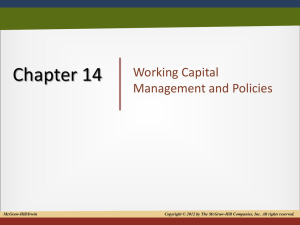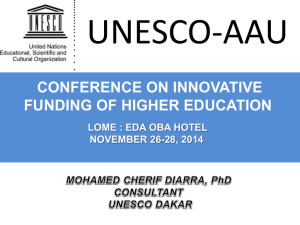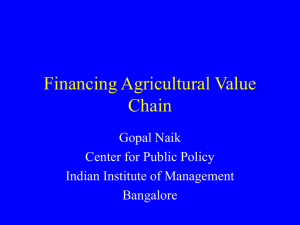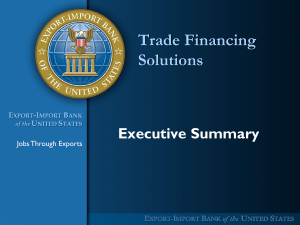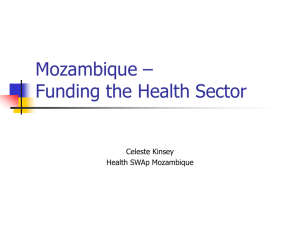Saudi Ethylene & Polyethylene Company
advertisement
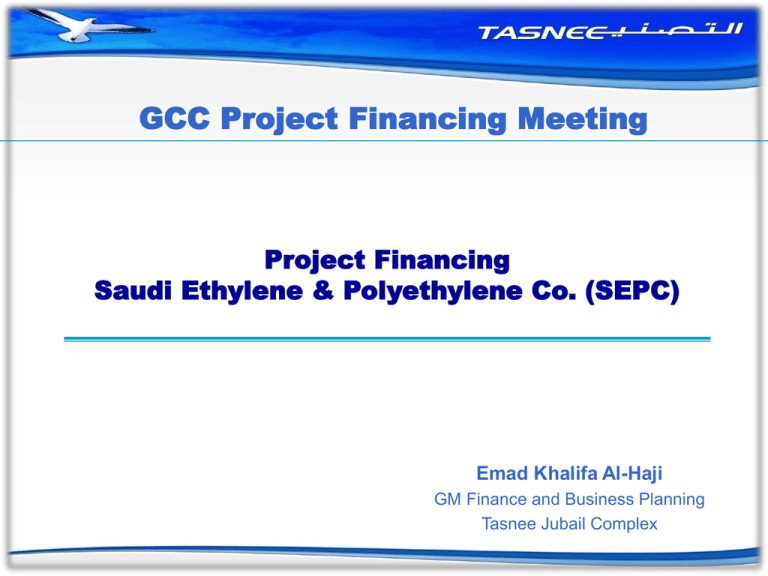
GCC Project Financing Meeting Project Financing Saudi Ethylene & Polyethylene Co. (SEPC) Emad Khalifa Al-Haji GM Finance and Business Planning Tasnee Jubail Complex Tasnee Introduction Tasnee is a Saudi Joint Stock Company established in Year the 1985. Managing a diversified investment of more than SR33 billion in various business sectors, with total turnover of SR11 billion as of Y2009. In the year 2000, decided to ‘Construct and Own’ Petrochemical Plants in Al-Jubail Ind. City. First investment, PDH and Polypropylene Plants of 450 KTA Capacity each, completed in Y 2004. PP expansion to 720KTA was completed in Y2009 to be one on the largest PP producer in the region. Second Ethylene Project investment was an Integrated & Polyethylene Plants with production capacity exceed 2.1 million TA. 2 total Project Sponsors Saudi Shareholders Foreign Shareholder Tasnee 45.34 % Sahara 24.41 % GOSI 5.25 % Lyodellbasell 25 % Saudi Ethylene & Polyethylene Company - SEPC 3 Project Overview Saudi Aramco Ethane Propane Linde Ethylene Plant Technology Ethylene Basell Polyethylene Unit HDPE ACP Technology Basell Lupotech Technology HDPE 400 KTA 4 Ethylene Ethylene 200 KTA Polyethylene Unit LDPE LDPE 400 KTA Propylene 285 KTA Intended Products - HDPE Film Grade SMALL BLOW MOULDING Application in small container, Packaging Pressure Pipe Grade Blow Moulding Small Blow Moulding Medium Blow Moulding Large FILM GRADE Application in carrier and Garment bags PIPE GRADE Application in drinking water pipes, sewage and gas transportation lines. 5 Intended Products - LDPE Cable Insulation Grade Heavy Duty Film Hygienic Film High Clarity Film GP • Food packaging. • Laboratory containers. • Computer components. • Medicine field. • Dispensing bottles. • Plastic bags. 6 Investment Advantage in Gulf Region Availability of Oil & Gas resources and related industries, has created great business opportunities. Strong government commitment to derisively the NDG income resources. Distinguished geographic location closer to the East & Fareast and European markets. Booming Project Finance Industry has resulted in competent and competitive financing resources. Steady growth in Global Market Demand on the basic and primary industrial materials. Established regulatory laws that helped to attract Private Investors (Local and Foreign). 7 Investment Advantages in Saudi Arabia Strong government support by providing feedstock and Utilities at attractive prices, government loans, customs and Taxes waivers etc. Creation of Industrial cities with strong infrastructure foundation for manufacturing and supporting industries. Sufficient Power and Industrial Water Requirements. Availability of experienced resources. Largest Project Financing Market in the Middle East. Steady evolution of the legal framework by the Government has facilitated to attract more foreign investments. 8 Investment Advantages in Saudi Arabia Feedstock & Utilities Cost Advantageous Industrial Cities Infrastructure Investor in Saudi Arabia Availability of Government & Commercial Loans Evolving of Government Investment Laws Experienced resources 9 SEPC Project Financing Alternatives Ongoing Industrial Boom has stretched the financing capacity of Commercial Banks in the Region. Project Sponsors have evaluating other commercial funding options such as Export Credit Agencies (ECA) , which are more economical. Creation of complex Financing Structure, where different financing tranches are linked together. Common Term Agreement (CTA) concept would be helpful in compiling different Loan agreements terms and condition in one agreement. Disadvantage of multi-sourced financing is the complexity of the terms and conditions. 10 SEPC Financing Structure 30% 41% 16% 13% Equity SIDF Debt PIF Debt Banks and ECAs Estimated Project Cost is USD 2.5 Billion 11 Sources of Government Loans Saudi Industrial Development Fund is providing loans to industrial investment along with technical, administrative, financial and marketing advices and it is affiliated to Ministry of Finance. PIF established to provide financing to commercial projects which are strategic for the development of the national economy and it is affiliated to Ministry of Finance SIDF grants short/medium term loans up to SR 600 Million for each project and charges no interest, but fees for administrative expenses. PIF grants Long term loans up to $400 Million and following the commercial banks loan structure but with attractive rates. Total government loans obtained was $720 Million. 12 Sources of Commercial Banks and ECA Loans Commercial Banks: Leading foreign and local banks were participating in SEPC financing structure, total Commercial loans received were $457 Million including working capital. o Saudi British /HSBC/SAMBA Financial Group/ Saudi Fransi Calyon, London / Societe Generale, France/West LB, London/ Royal Bank of Scotland. ECA’s: private or semi-governmental bodies that extends credit to local suppliers and provide necessary Guarantee (buyer receives good or service in advance and makes payment later, as well as provide insurance for export. Total ECA’s loans received were $730 Million. o o HERMES (Germany), SACE (Italy), KEXIM/KEIC (South Korea). Project Information Memorandum was issued to Potential Lenders in September 2005, and Loan Agreements were signed in June 2006. Bridge loan were arranged until Financial closure was achieved in Dec 2006 before the depletion of equity money. 13 Success Factors Promoting safety culture. Strong Sponsors commitment from both owners and partners side. Early identification of project scope. Experienced EPC Contractors. Setting dependant project organization IMT with experienced and diversified team. Successful loan bridging strategy. Strong Financing Structure, and timely completion of financial closure. Early preparation for plant operation activities. Project completion on schedule and within budget. 14 Best Deal Award for SEPC Financing SEPC’s Financing has been awarded ‘Best Deal of the Year 2006’ by Project Finance International, a leading publication in Project Financing The Award is for Petrochemical Sector in Europe, Middle East and Africa SEPC won the award ahead of the projects sponsored by Dow Chemical, Saudi Aramco, SABIC, Kuwait Petroleum, Oman Oil Company and LG Group 15 Tasnee Main Ranking 1st 2nd Industrialization Joint-Stock Wholly Owned by Private Sector 1985 Largest Saudi Industrial & Petrochemical Company 13th 2nd Largest Global Producer of Titanium Dioxide Top 1st Project Finance Award 2006 Best Work Environment in Saudi Petrochemicals 2008 & 2009 1st 16 Largest Saudi Company Saudi Company of The Year 2008 Global Impact / challenges of project Financing Some of the major factors that impact the project financing are: World wild recession and the impact of the financial crisis. The exposure of local banks overseas assets to the financial crisis (subprime mortgage ) has limited the banks financing capabilities. Bank adoption of stringent lending policies has limited banks growth. Drop in oil prices limited the government spending which has resulted in slowing the domestic growth. Drop in demand for the basis building and manufacturing materials has resulted in major prices turn down and limited growth opportunity. Changes in Project Economics 17 Thank You!

